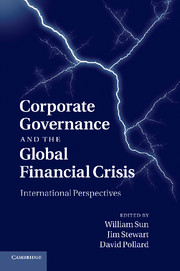Crossref Citations
This Book has been
cited by the following publications. This list is generated based on data provided by Crossref.
Zimnovitch, Henri
2012.
La Revue des livres.
Comptabilité Contrôle Audit,
Vol. Tome 18,
Issue. 3,
p.
185.
Wallo, Andreas
Kock, Henrik
and
Nilsson, Peter
2012.
Accelerating and braking in times of economic crisis.
European Journal of Training and Development,
Vol. 36,
Issue. 9,
p.
930.
Samborski, Adam
2012.
Zarządzanie ryzykiem w przedsiębiorstwie – uwarunkowania w kontekście zasad nadzoru korporacyjnego.
Zeszyty Naukowe SGGW - Ekonomika i Organizacja Gospodarki Żywnościowej,
p.
101.
Fong, Adrian
2012.
Roles and Responsibilities of 21st Century Board.
SSRN Electronic Journal,
O'Leary, Conor
Boolaky, Pran
and
Copp, Richard
2013.
The Negative Impact of Additional Legislation on Corporate Stewardship.
Australian Accounting Review,
Vol. 23,
Issue. 4,
p.
357.
Nedelchev, Miroslav Kolev
2013.
Good Practices in Corporate Governance: One-Size-Fits-All vs. Comply-or-Explain.
SSRN Electronic Journal,
Perez, Roland
2013.
Dictionnaire critique de la RSE.
p.
226.
Dănescu, Tatiana
Prozan, Mihaela
and
Dănescu, Andreea Cristina
2014.
Accounting Policies and Procedures – Theoretical and Practical Connotations in Treating Risks.
Procedia - Social and Behavioral Sciences,
Vol. 131,
Issue. ,
p.
332.
Teker, Suat
and
Yüksel, Ahmet Hakan
2014.
Stock Price Reaction for Scoring on Corporate Governance.
Procedia - Social and Behavioral Sciences,
Vol. 150,
Issue. ,
p.
985.
Dimitrov, Roumen
2014.
Bringing communication up to agency: UNESCO reforms its visibility.
Public Relations Inquiry,
Vol. 3,
Issue. 3,
p.
293.
Inauen, Emil
Osterloh, Margit
Frey, Bruno S.
and
Homberg, Fabian
2015.
How a multiple orientation of control reduces governance failures: a focus on monastic auditing.
Journal of Management & Governance,
Vol. 19,
Issue. 4,
p.
763.
Canet, Antoine
2016.
The Regulatory Corporate Governance Framework for Financial Institutions - A Critical Analysis of the Dodd-Frank and CRD IV Governance Provisions.
SSRN Electronic Journal,
Michelberger, Knut J.
2017.
Survey On Competence and Administration of Supervisory Board Activities in German Stock-Listed Companies.
Economics and Business,
Vol. 30,
Issue. 1,
p.
62.
Nedelchev, Miroslav
2018.
Coordination of banking supervision in the European Union.
Economy of Industry,
Vol. 83,
Issue. 3,
p.
43.
Karkowska, Renata
and
Acedański, Jan
2020.
The effect of corporate board attributes on bank stability.
Portuguese Economic Journal,
Vol. 19,
Issue. 2,
p.
99.
Lin, Jing
and
Qamruzzaman, Md
2023.
The impact of environmental disclosure and the quality of financial disclosure and IT adoption on firm performance: Does corporate governance ensure sustainability?.
Frontiers in Environmental Science,
Vol. 11,
Issue. ,
Nelemans, Mark D. H.
2023.
ESG Integration and SRI Strategies in the EU.
p.
217.
Mahdi El Koudsi, El
Simmou, Samira
Simmou, Walid
Bengrich, Mustapha
and
Alourhzal, Hajar
2024.
Modern Corporate Governance Strategies for Sustainable Value Creation.
p.
221.
Paranhos, Maria Aparecida Hess Loures
Nääs, Irenilza de Alencar
and
Neto, Pedro Luiz de Oliveira Costa
2024.
Evolution and Challenges of Environmental, Social, and Governance Practices: An Analysis of the Brazilian Stock Exchange’s Corporate Sustainability Index.
Sustainability,
Vol. 16,
Issue. 15,
p.
6531.
Dumitrescu, Diana
Bobitan, Nicolae
Popa, Adriana Florina
Sahlian, Daniela Nicoleta
and
Stanila, Cosmina Adela
2025.
Signaling Financial Distress Through Z-Scores and Corporate Governance Compliance Interplay: A Random Forest Approach.
Electronics,
Vol. 14,
Issue. 11,
p.
2151.



